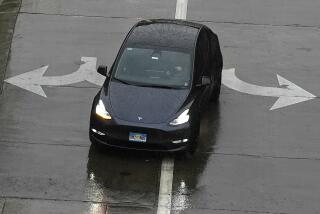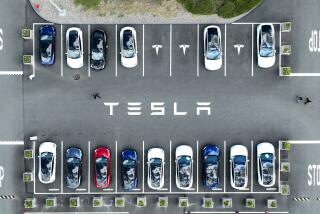Gulf Tension Cuts Early January Car Sales
DETROIT — Mirroring the mood of caution and uncertainty as Americans awaited a day of decision in the Persian Gulf, sales of cars and trucks built in the United States plunged an estimated 31% in the first 10 days of January.
Following a well-worn trend, the Big Three U.S. auto makers fared significantly worse than their Asian rivals that produce vehicles in the United States.
The Big Three posted an estimated 33.3% decline in total vehicle sales for the period, while sales of vehicles produced by Asian auto makers in the United States were up by 10% from the 1990 period.
The sales results for the three U.S.-based companies are estimated because Chrysler Corp. has stopped reporting 10-day sales results. Chrysler’s sales performance is estimated based on its recent share of the market.
The early January sales results continue the general downward slide that vehicle sales have suffered since Iraq invaded Kuwait on Aug. 2.
But even if the Persian Gulf crisis is resolved soon, analysts warned, car sales will not bounce back dramatically.
Americans bought an average of 19,123 North American-built cars and trucks a day during the first 10 days of January, compared to an average daily rate of 26,621 during the same period in 1990.
General Motors Corp. posted a 28% decline in auto sales; its trucks sales slid 26%. Ford said car sales were down 40% and trucks 30%. Chrysler’s total vehicle sales were estimated to have slipped 44% from the same period last year.
Among Japanese-nameplate cars built in this country, Honda’s sales were up a slight 2.6% after an unusual drop in December. In a move reflecting the troubled times confronting the entire auto industry, the company last week instituted dealer incentives on the nation’s top-selling model, the Accord.
Toyota said sales of domestically produced vehicles declined 35%, while Mitsubishi sales tumbled 30%. Nissan’s surged by about 94%, however, and Mazda’s rose 16%. In general, the Japanese car makers’ overall sales have been declining, but these figures do not include cars imported from Japan.






